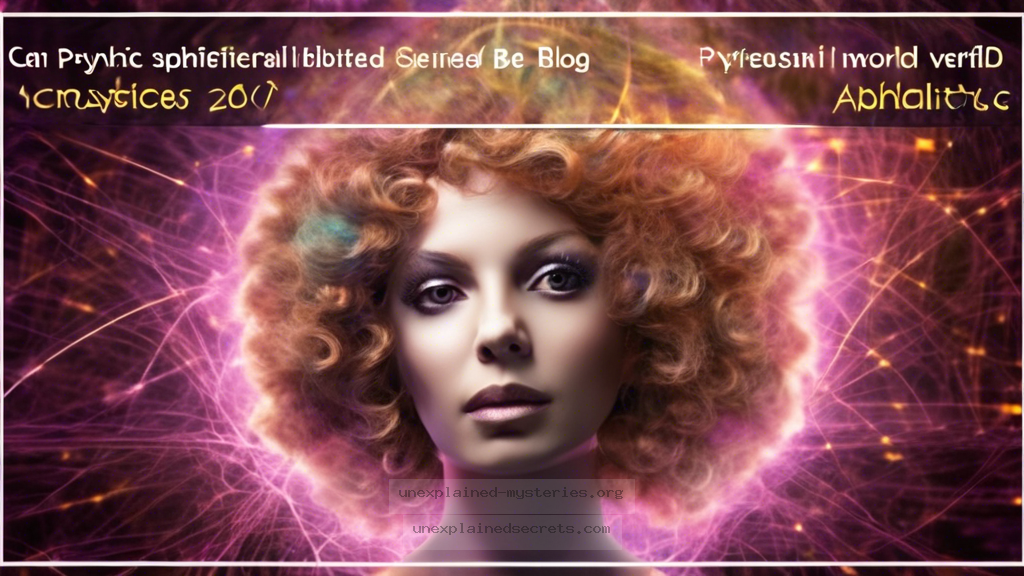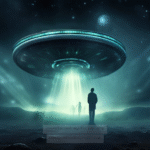Can Psychic Abilities Be Scientifically Measured and Verified?
Can Psychic Abilities Be Scientifically Measured and Verified?
The world of psychic abilities is often shrouded in mystery, capturing the imaginations of many while simultaneously being met with skepticism. Can psychic phenomena, such as telepathy, clairvoyance, and precognition, be scientifically measured and verified? This question not only probes into the realm of the unexplained but also challenges the very fabric of our understanding of consciousness and human potential. In this blog post, we will explore documented cases, scientific investigations, historical perspectives, and the ongoing debates surrounding psychic abilities.
Introduction to Psychic Abilities
Psychic abilities, often referred to as extrasensory perception (ESP), encompass a range of phenomena that appear to defy conventional scientific explanation. These abilities include telepathy (the ability to communicate thoughts without verbal expression), clairvoyance (gaining information about an object or event without using the known senses), and precognition (foreseeing future events). The allure of these powers often leads individuals to seek out their validity, prompting a closer examination of whether they can be scientifically validated.
Historical Context of Psychic Research
The pursuit of understanding psychic phenomena dates back centuries, with various cultures and civilizations attributing mystical powers to certain individuals. In the early 20th century, the establishment of parapsychology as a scientific field emerged, spearheaded by researchers like Joseph B. Rhine at Duke University. Rhine’s experiments, particularly those involving Zener cards, aimed to demonstrate statistically significant results supporting the existence of ESP. Despite initial interest, many of these studies faced criticism regarding methodology and reproducibility.
Core Concepts and Theories of Psychic Phenomena
At the heart of the discussion on psychic abilities lies the concept of consciousness. Some theorists argue that psychic phenomena are a byproduct of a collective unconscious or a quantum field of information that transcends time and space. Theories such as the “many-worlds interpretation” of quantum mechanics have been cited to explain how psychic abilities might function, proposing that these powers allow individuals to tap into alternate realities or dimensions of time. However, these theories remain largely speculative and lack empirical support.
Documented Cases of Psychic Abilities
Numerous documented cases have attempted to provide evidence for psychic phenomena. One notable example is the story of Uri Geller, an Israeli psychic known for his purported ability to bend spoons and perform telepathy. Geller gained fame in the 1970s, and while some scientists attempted to validate his abilities, many concluded that his tricks were illusions rather than genuine psychic phenomena.
Another compelling case involves the “Scole Experiment,” conducted in England during the 1990s, where a group of researchers observed a series of paranormal events, including materializations and psychic phenomena, during seances. Despite detailed documentation, skeptics argue that the findings lack rigorous scientific scrutiny and replicability.
Scientific Testing of Psychic Abilities
Scientific testing of psychic abilities has been met with both intrigue and skepticism. Various experiments, including those using random number generators (RNGs) to test for precognition, have produced mixed results. While some studies show statistically significant outcomes, critics argue that the effects can be attributed to chance or methodological flaws. The challenge remains: how can one design an experiment that isolates psychic abilities from other variables?
Practical Implications of Psychic Research
Understanding psychic abilities has practical implications for areas such as psychology, medicine, and even national security. For instance, some researchers have explored the potential of psychic phenomena to enhance therapeutic practices, suggesting that intuitive insights can complement traditional methods. Additionally, organizations like the U.S. military have invested in psychic research, particularly during the Cold War, exploring concepts like remote viewing as potential intelligence-gathering tools.
Alternative Perspectives on Psychic Phenomena
While some researchers advocate for the validity of psychic abilities, others vehemently oppose the idea. Skeptics argue that many claimed psychic phenomena can be explained through psychological principles such as confirmation bias, where individuals remember instances of “success” while overlooking failures. Additionally, the placebo effect can play a significant role in perceived psychic experiences, leading individuals to believe in their abilities even without verifiable evidence.
Common Misconceptions and Clarifications
Several misconceptions surround the topic of psychic abilities that warrant clarification. One common belief is that all individuals possess psychic capabilities. While some may have heightened intuitive skills, the extent and nature of these abilities can vary widely. Another misconception is that psychic abilities are always reliable and accurate; in reality, many reported psychic experiences are inconsistent and context-dependent.
Best Practices for Investigating Psychic Phenomena
If you’re interested in investigating psychic phenomena, it’s essential to approach the subject with an open yet critical mind. Here are some best practices to consider:
- Document your experiences meticulously, noting any patterns or anomalies.
- Engage with established researchers and organizations in the field of parapsychology.
- Maintain skepticism and seek alternative explanations before attributing experiences to psychic abilities.
- Participate in controlled studies or experiments to gather more substantial data.
Future Developments in Psychic Research
The future of psychic research holds promise as technology advances and interdisciplinary approaches emerge. As neuroscience continues to explore the complexities of the human brain, new methodologies may provide insights into the mechanisms behind psychic abilities. Some researchers advocate for the integration of quantum physics and consciousness studies to explore the boundaries of human perception and experience.
Conclusion: The Enigma of Psychic Abilities
The question of whether psychic abilities can be scientifically measured and verified remains a tantalizing enigma. While historical accounts and documented cases provide intriguing insights, the scientific community continues to grapple with skepticism and the challenges of empirical validation. As we venture into the future, the exploration of psychic phenomena will require an open-minded approach, rigorous scientific methodology, and a willingness to question the boundaries of human potential. Whether these abilities are genuine or merely a fascinating aspect of human psychology, they continue to captivate our collective imagination. 💡
Other Articles
Recent Posts
- What Happened to Flight MH370? The Conspiracy Theories That Still Haunt Us
- What Secrets Lurk Within the Walls of the Infamous Trans-Allegheny Lunatic Asylum?
- What Evidence Supports the Existence of Bigfoot in the Pacific Northwest?
- What Happened to the Indus Valley Civilization? Unraveling the Mysteries of Ancient Urban Life
- Can Telepathy Be Scientifically Proven Through Laboratory Evidence?







